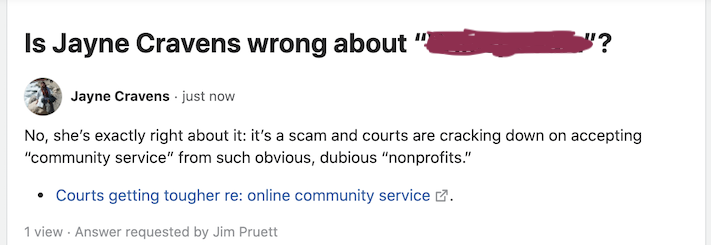It’s a sad reality that there are people that use nonprofits and charities to try to make money for themselves, and that recruit volunteers to “help”.
Here are some red flags to look for when signing up to volunteer, so that you can avoid being financially exploited – or worse:
- The organization wants a large fee for you to volunteer. Involving volunteers is not free, and it’s not unusual for organizations to ask volunteers to pay a small fee to cover some costs – up to, say, $50 – but most organizations will offer to waive a fee for any applicant that says the fee will be cost prohibitive to volunteer. If an organization is asking for a fee, but doesn’t say what that fee pays for, ask.
- The organization has volunteers working with children or other vulnerable people, but does no screening of volunteers, has no policies regarding behavior and grounds for dismissal, etc. Even if the work is done online, if children or other vulnerable people are involved, screening and policies need to be in place. If they aren’t on the web site, ask for such.
- The organization doesn’t have its board of directors listed on the web site. This is always a red flag. A one-person nonprofit – a web site that has lots about the founder but not about other volunteers or the board – or that doesn’t list any board members or staff, is a nonprofit to steer clear of.
- The organization talks a lot about “We can give hours!” That doesn’t mean anything. It’s a completely meaningless statement. If you are volunteering to meet a high school graduation requirement, any volunteering for a nonprofit organization should qualify. If you are volunteering to meet a court order, you have to clear the volunteering with the court contact BEFORE you volunteer. If you are volunteering in hopes of getting admitted to a university or to get a scholarship, the number of hours does NOT matter – what you did, what you learned, what you accomplished, the leadership you exhibited, etc. are what matter.
- The organization’s web site is awash with photos from photo-sharing sites, rather than photos of their own actual volunteers, staff and clients.
- The organization never says why volunteers are in these roles it is recruiting for, or just says, “We can’t pay people, so we recruit volunteers.” The organization should have a reason it reserves certain roles for volunteers, and the web site should give this reason.
- The organization emphasizes repeatedly that you can use the volunteering to fulfill a court order, in exchange for a fee. There are nonprofits that have been sued for this practice by State Attorneys General.
And in addition to these, for volunteering abroad (in a country different from your own), look for these red flags:
- The organization wants short-term volunteers, for just a few weeks, and no specialized skills are necessary. There are zero credible organizations in other countries that need foreign volunteers with no specialized skills to come to their site and do something that local people are perfectly capable of doing themselves. If you encounter such, you will find that they are asking for a great deal of money for you to come and do this “volunteering.” That’s a vacation, not volunteering.
- The organization has no local people on its board or leadership team.
- The organization wants these short-term, unskilled volunteers to do something highly unethical, like interact with children, work in an orphanage or interact with wildlife.
- The organization does no screening at all, doesn’t check references, etc. – you pay a fee and you get to “volunteer.”
Please be cautious before signing up to volunteer. Look at the web site carefully. Ask questions. Ask to speak with a current or previous volunteer. Type the name of the organization into Google or Duck Duck Go along with words like ripoff or scam or beware and see if anything comes up.
Here are all of my blogs about some aspect of court-ordered community service.
Here are my voluntourism-related & ethics-related blogs.

If you have benefited from this blog or other parts of my web site and would like to support the time that went into researching information, developing material, preparing articles, updating pages, etc. (I receive no funding for this work), here is how you can help.










